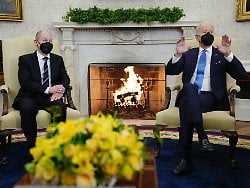A day in Washington
About the doubts of the Americans and the stubbornness of the chancellor
By Christian Wilp, Washington
2/8/2022, 8:04 p.m
If the Chancellor’s intention was to improve the Americans’ image of Germany, the inaugural visit may not have gone well. The top topic in Washington was Berlin’s unclear position on Nord Stream 2.
He doesn’t say it. Everyone talks about it, just not Olaf Scholz. The words Nord Stream 2 never crossed the lips of the Chancellor during his visit to Washington. The US President, on the other hand, has no problem declaring the pipeline closed if Vladimir Putin even allows a tank to cross the border with Ukraine. “Then we will put an end to this,” says Joe Biden. Scholz, on the other hand, sticks to his vague wording, which he had already worked out before the trip. “We are close allies and act in a very coordinated and unified manner.”
The pipeline follows Scholz like a shadow throughout his Washington visit. In his sweater performance in front of journalists on the plane, the press conference with Joe Biden and also the CNN interview with Jake Tapper: Nord Stream 2 is top topic number 1.
According to a uniform commentary, Scholz earned respect for facing the star moderator of the American news network live. But the Chancellery can hardly be satisfied with the result. Nord Stream 2 remains the sticking point between Germany and the USA, titles CNN after the interview on its website. One wonders why Scholz doesn’t state the obvious and promise the burial of the project just in case? Observers who have known Scholz for a long time point to a certain “stubbornness” on the part of the Chancellor.
However, this stubbornness has its price. Publicly, Joe Biden gives the perfect host at the joint press conference. He praises Scholz and praises Berlin’s “absolute reliability”. Those familiar with the White House protocol privately acknowledge that Scholz is only offered the austerity program. No lunch together, no jovial small talk in the Oval Office, a round without extras. Scholz can be fortunate that the Americans have no interest in presenting Western discrepancies to the Russians in front of the whole world. Then more harmony.
The US media pay no attention to external representation. From the liberal “Washington Post” to the conservative “Wall Street Journal” there is one opinion: Germany is seen as an insecure clerk who cannot be relied on in times of crisis. Not only Nord Stream 2 contributes to this assessment, the 5000 helmets and the non-delivery of weapons to Ukraine complete the ugly overall picture. The federal government, on the other hand, feels unjustly criticized. In Washington, Scholz himself repeatedly referred to the high level of financial transfers to Ukraine and Germany’s central role in NATO.
Alone: Scholz’ lack of clarity makes every image polish fade. “We have a problem,” the German ambassador in Washington, Emily Haber, hastily wired to the chancellery in view of the bad mood before the trip. Unfortunately, one has to state: Haber’s worries have remained.
